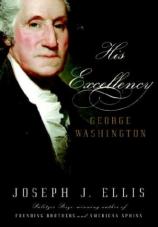His Excellency: George Washington
Review
His Excellency: George Washington
In the preface to this ambitious and largely successful biography
of George Washington, Joseph J. Ellis sets the tone by calling his
subject "America's greatest secular saint" and "the Foundingest
Father of them all."
That puts the biographer's problem nicely. Washington is so
universally revered as well as so distant from us in time that he
is more marble than human flesh. The biographer's task is to
somehow breathe life back into a monument. Ellis has a good track
record at this sort of thing. Most recently he did the trick with
Thomas Jefferson in AMERICAN SPHINX. His work on Washington is in
somewhat the same vein, and is equally accomplished.
Ellis's approach sails close to the dangerous shoals of
psycho-biography but never quite runs aground on them. In trying to
fathom Washington's true character and motives, he sticks fairly
close to the written record without presuming to peer inside his
subject's head.
His conclusions are not always those that today's schoolchildren
find in their history texts. In the narrow tactical sense, for
instance, Ellis judges Washington no great military genius. He
points out that Washington lost more battles than he won, he was a
control freak and a man very conscious of his place in history.
Despite this "posing for posterity," however, Ellis is favorably
inclined toward his subject because he had a career "devoted to
getting the big things right."
That career, of course, had two separate parts: military commander
and --- after four years in retirement --- our first President.
Ellis links the two by stressing something not much emphasized by
other historians: The job of establishing the new nation was made
infinitely more complicated by the memory of British colonial rule,
which had bred a general suspicion of any strong central authority.
Washington knew that without a strong central government the new
nation would probably fail, but he had somehow overcome the popular
hatred of governmental "tyranny" and even the dread specter of
"monarchy." He was able to accomplish this balancing act mainly
through the sheer veneration in which he was held by the vast
majority of people. In Ellis's apt phrase, Washington was able to
"levitate" above the partisan battles of his time.
Ellis finds Washington's military experience on what was then
America's western frontier (western Pennsylvania and the nearby
"Ohio Country") during the French and Indian War a crucial
experience in forming his world-view. It gave him a grand vision of
an American western-oriented destiny that stayed with him into his
Presidency. He even thought erroneously that the Potomac River,
which flowed placidly past his estate at Mount Vernon, might be the
water gateway to the riches of the American interior.
Another issue that Ellis illuminates is that of Washington's
attitude toward slavery. His letters show that he was in favor of
eventual emancipation by slow and easy stages --- but also that he
needed slaves to keep Mount Vernon from sliding into bankruptcy and
ruin. There was an uneasy balance of morality and economics in his
thinking.
Ellis is also interesting --- if obviously partisan --- in
assessing the infighting among Washington, John Adams, Jefferson
and Alexander Hamilton during his presidency. Jefferson in
particular comes off badly here.
One minor cavil: Ellis is so concerned with Washington's public
career that he largely slights his private life. Martha Washington,
for instance, is merely an offstage shadow in this book. Ellis is,
however, a vivid and engaging writer. The Washington he recreates
seems almost like a normal human being in many respects. That is
about all we can ask for at this distance in time.
Reviewed by Robert Finn (Robertfinn@aol.com) on January 22, 2011
His Excellency: George Washington
- Publication Date: October 26, 2004
- Genres: History, Nonfiction
- Hardcover: 352 pages
- Publisher: Knopf
- ISBN-10: 1400040310
- ISBN-13: 9781400040315





